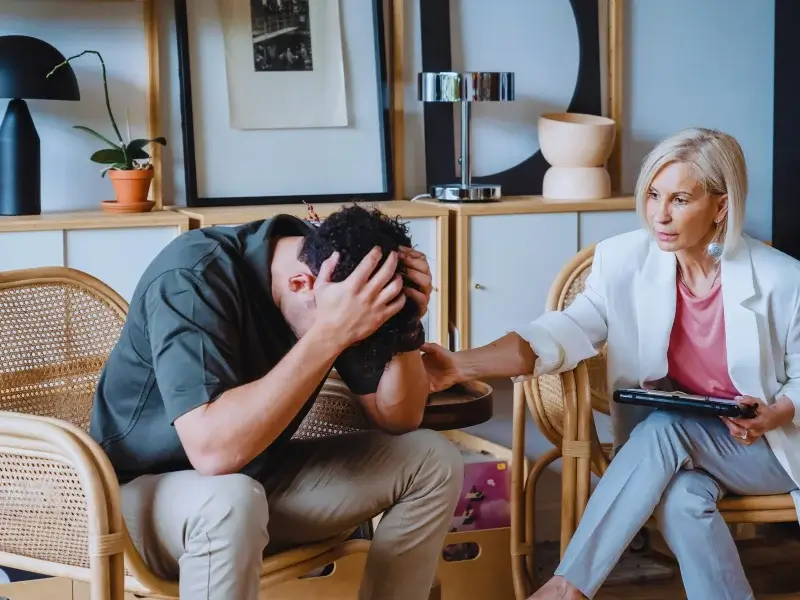
Living with both OCD and depression can be a heavy burden to carry.
If you’re facing this, know that you’re not alone.
Studies show that nearly 41% of people with OCD also deal with major depressive disorder, which means it’s very common to manage both at the same time.
When these struggles come together, compulsive behaviors and low moods can feed off each other, making everything feel even harder.
That’s why finding the right care matters so much.
CNS Center Arizona has walked alongside many individuals and families to provide support and treatment plans for people with depression, OCD, and anxiety.
Understanding OCD and Depression Together
How OCD and Depression Are Connected
OCD and depression frequently occur together.
This is because the ongoing cycle of obsessive thoughts and compulsive behaviors can significantly impact one;s emotional well-being greatly.
A study from the Social Psychiatry and Psychiatric Epidemiology found that individuals with both OCD and depression have higher levels of functional impairment and a poorer quality of life.
When your mind is constantly battling intrusive thoughts, it’s no wonder you might feel drained or defeated. Treating both conditions at once is crucial for lasting relief.
Why It’s Important To Treat Both Conditions Together
Treating only one condition, like depression or OCD, can leave the other one unaddressed, causing ongoing mental health problems.
If depression is treated without focusing on OCD rituals, mood improvement may happen, but the compulsions and anxiety from OCD will continue to affect your emotional well-being.
This can make it harder to fully recover and creates a cycle that doesn’t fully address the issues.
CNS Center Arizona treats both disorders together to ensure that the underlying causes of both are addressed, for the proper treatment you need.
Managing Daily Challenges With Compulsive Behavior Treatment
What Causes Compulsive Behavior
Compulsive behaviors often start as an attempt to control anxiety.
Research suggests that certain areas of the brain, like the orbitofrontal cortex, can become overactive, leading to repeated checking, cleaning, or counting.
Genetics, brain structure, and past trauma are common factors that influence what causes compulsive behavior.
It’s not about being “too picky” or “too careful” — these behaviors are real symptoms of a deeper struggle.
Practical Ways To Manage Compulsive Behavior

Learning how to manage compulsions starts with small, realistic steps.
Behavioral therapies like Exposure and Response Prevention (ERP) teach you to face fears without giving in to rituals.
In Arizona, many therapists, including our team at CNS Center Arizona, integrate ERP into treatment plans because research shows it’s one of the most effective approaches.
Medication may also be part of treatment to help reduce the urge to perform compulsions.
Recognizing OCD Rituals and How They Impact Depression
Common OCD Rituals To Watch For
OCD rituals vary from person to person, but they usually involve repetitive actions or mental habits done to ease anxiety.
Actions such as excessive hand washing, checking locks, counting, or mentally reviewing conversations are just some of the symptoms.
While they might seem harmless at first, these rituals can take over your time and energy, leaving you feeling isolated and frustrated.
How OCD Rituals Can Worsen Depression
When rituals start eating up your day, they can leave little room for things that bring you joy or meaning.
Over time, this constant cycle of fear and ritual can fuel hopelessness and deepen depression.
A study from BMC Psychiatry highlights that untreated OCD rituals often lead to a greater risk of chronic depression.
The Full Picture Of Depression and OCD and Anxiety
Why Anxiety Plays a Big Role
Anxiety can be a constant, overwhelming force in the life of someone with OCD.
It creates a pervasive sense of unease and makes every day feel like a battle with your own mind.
This anxiety is often rooted in obsessive thoughts such as disturbing, unwanted ideas or fears that seem to come out of nowhere.
These thoughts cause a sense of urgency, creating a feeling that something terrible might happen unless you perform a certain action or ritual.
The pressure to perform these compulsive behaviors can feel unbearable, and yet, the relief they bring is often temporary.
If left untreated, the anxiety will continue to drive the obsessive thoughts and compulsive behaviors, making it nearly impossible to break free from the cycle.
How To Calm the Mind and Body

Relaxation techniques, such as deep breathing, progressive muscle relaxation, and mindfulness, can help lower anxiety in daily life.
Medications like SSRIs (Selective Serotonin Reuptake Inhibitors) often help too.
Here at CNS Center Arizona, we personalize treatment options because what helps one person’s anxiety might not help others.
A balanced plan combining therapy, medication, and lifestyle changes often works best.
Getting Help for OCD and Depression Treatment
How Professional Treatment Makes a Difference
Trying to manage OCD and depression on your own can feel exhausting.
Professional treatment offers structure, support, and expertise that self-help often can’t provide.
Cognitive Behavioral Therapy (CBT) and medication are usually the frontline treatments, supported by dozens of clinical studies.
Our team at CNS Center Arizona works closely with you to figure out what works best for your specific symptoms, lifestyle, and personal goals.
Why Local Care Matters
Living in Arizona, you have unique needs.
The stress of long commutes in Phoenix traffic or feeling isolated in more rural areas like Payson can make mental health struggles even harder.
That’s why finding local support you can trust is important.
CNS Center Arizona is here to support the community, and we understand the local challenges our neighbors face.
You don’t have to fight this battle alone.
Managing Everyday Life With Both Conditions
Setting Small, Realistic Goals
Managing OCD and depression is a gradual process, and it’s important to recognize that significant progress doesn’t happen all at once.
Setting small, manageable goals, such as taking short walks or reducing the frequency of compulsive behaviors, helps break the cycle of overwhelming thoughts and actions.
These smaller steps allow you to focus on immediate and achievable tasks to avoid putting pressure on yourself.
Building a Reliable Support System
Having friends, family, or a support group who understand your struggles makes all the difference.
Sometimes just knowing you’re not alone helps ease the burden.
We encourage you to involve trusted loved ones in your care when possible, because healing is often a team effort.
Find Hope Through OCD and Depression Treatment at CNS Center Arizona
Managing OCD and depression at the same time can feel like a heavy burden, but with the right help, it’s completely possible to find relief.
Treatments that address compulsive behavior causes, OCD rituals, and depression symptoms together give you the best chance for proper recovery.
Living in Arizona brings its own set of challenges, but having local, specialized care through CNS Center Arizona can help you handle that.
Our team has decades of knowledge in helping people just like you or your loved one take back control and find peace again.
If you’re looking for OCD and depression treatment, we invite you to reach out.
Together, we can help you build a future where OCD and depression no longer control your life.





